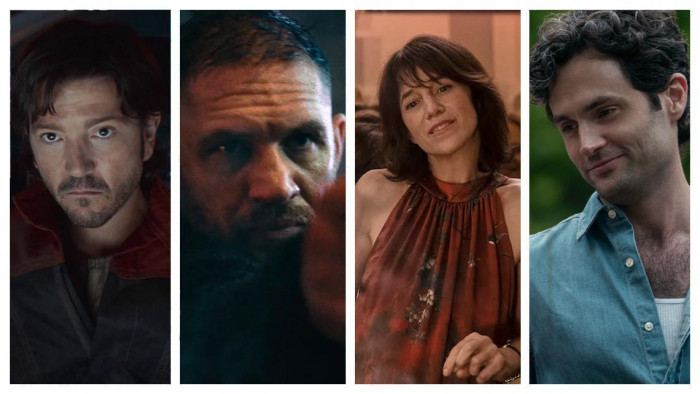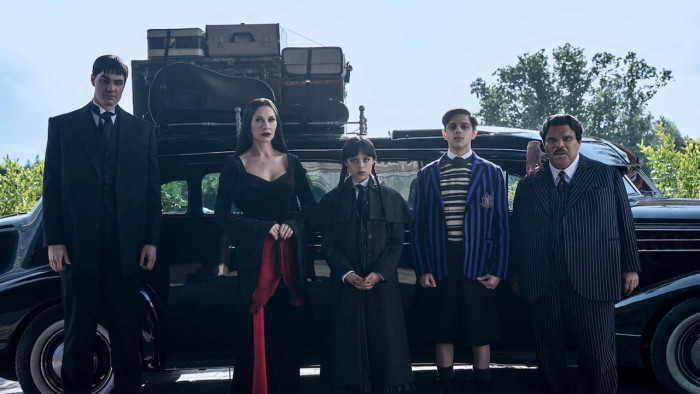Was 'The Inbetweeners' ever truly acceptable?
Weeks after one of its star complained people would find the show too offensive today an anniversary reunion has been announced - but do we really want it?


Ten years after the show first aired, the original Inbetweeners cast members are set to reunite for a special show to mark the anniversary of the sitcom appearing on our screens. But is the show really worth celebrating?
Last month James Buckley, best known to Inbetweeners fans as comedy teen sex-pest ‘Jay’, told Digital Spy:
“I do think that possibly people would maybe be more offended by The Inbetweeners if it was to be made today… it feels very black and white with comedy. There’s no in-between, it’s just, ‘This person said this on television – isn’t that terrible?’ and it’s killing comedy, because you’re not allowed to joke about anything, it seems. There seems to be a joke police, nowadays.”
You got that right Sonny Jim, this is PC Gonemad, so step away from the banter, put your hands on your ‘Mingemobile’ and don’t you dare think about reaching for a comeback series, because your enduringly popular show is now illegal in the hypothetical present.
Why? Well having rewatched YouTube compilations of the ‘Funniest Moments’ from all 3 series in the cold light of 2018, I’ve got your ‘sitcom’ on charges of rampant misogyny, casual homophobia and routinely using disabilities as little more than slapstick props. In other words: you’re nicked, Jim.
But officer, he replies, “when The Inbetweeners was around, everyone understood the context – that they were kids… there used to be a sympathy, where you could almost forgive them, because you can’t really have a go at someone for being stupid – that’s not really their fault.”
“The comedy is apparently satirising offensive jokes, while still getting to make them, alongside a load of cakes, which they’re also eating”
Ah, the Alf Garnett defence. We aren’t laughing with the characters’ unsavoury worldviews, but at them. The Inbetweeners was essentially an American Pie homage set in a British sixth form with the addition of a character that ingeniously sidestepped any accusation of being a junior Mark Corrigan rip-off by wearing glasses. The hormone-addled foursome hopelessly flail their way through their A-Levels, and more importantly, in their attempts to lose their virginity and in fairness to Buckley, he’s right in the respect that you’re supposed to think the characters are buffoonish, dim-witted losers. But he’s also right that you’re meant to sympathise with them. You like them. They’re funny. Suddenly that laughing at/with line becomes muddied. The comedy is apparently satirising offensive jokes, while still getting to make them, alongside a load of cakes, which they’re also eating.
But this is all academic, because apparently, in this new post-political correctness world, The Inbetweeners is illegal. When did this change occur? Well, we know the sitcom in question finished in 2010, perhaps under the boot of modern sensibility, but then it produced two successful spin-off movies which grossed a cumulative nigh-on £100 million pounds at the box office as late as 2014. The forces behind the powerful political correctness brigade must have reared their head at some point in the last three years.
“It seems to be cool at the moment to be offended by stuff, and that’s a shame,” sighs a jaded Buckley. “It seems to be in vogue at the moment, and I’m hoping it will pass.”
Who’s behind this shadowy cabal of comedy killing Political Correctness? Politicians? Well, not quite, given the incumbent US President was elected after a campaign in which he repeatedly lambasted it whenever questioned on his views on Islam, and women. “I think the big problem this country has is being politically correct. I’ve been challenged by so many people, I don’t frankly have time for total political correctness. And to be honest with you, this country doesn’t have time either” Trump told a (mostly) confused crowd back in June.
“If attitudes evolve to the point your humour is so unpalatable you can no longer earn a living from it, well then you are Jim Davidson”
Is it the actual police, then, who are acting as benevolent arbiters of wokeness, raining punitive justice down those who offend liberal sensitivities, banging up people just for wearing a semi-ironic ‘Pussy Patrol’ t-shirt? Given this report from earlier in the week found institutional racial bias to be increasing, nope, probably not.
Fine, then is it the gatekeepers of the entertainment industry who are blacklisting anything and anyone who ventures a joke that might be construed as to someone, somewhere, no matter how apparently innocuous?
That would explain why committed opponents of political correctness like Ricky Gervais, Jerry Seinfeld and Bill Burr keep getting Netflix specials. Or why decidedly un-PC sitcoms like South Park, Always Sunny In Philadelphia and Mrs Brown’s Boys are still on air. Or how Rowan Atkinson was able to defend Boris Johnson’s ‘freedom’ to ridicule burqas at the same time as he released Johnny English 2. Or why Sacha Baron Cohen is still considered a valuable cultural commentator, despite having made Borat, Bruno,The Dictator, and Grimsby a film which has as a central premise that a decades-old ‘chav’ stereotype has become a spy, and that he shoots people with AIDS, and which came out two years ago. Or how The Festival, a film which is basically The Inbetweeners (which you can’t make nowadays) but at a festival, starring one of the main actors from The Inbetweeners (which you can’t make nowadays), and directed by one of creators of The Inbetweeners (which you can’t make nowadays), came out literally this year.
When we’re talking about the perceived inability to be ‘offensive’ in comedy ‘today’, we’re pretty much only talking about it within narrow parameters of traditional media. Maybe your gross-out delibero-offensive show won’t get commissioned for a primetime 9PM BBC2 slot, but it doesn’t seem there’s any real dearth in opportunity for it to exist elsewhere.
Who is behind this grave threat to comedy, then? When it comes down to it, the apparently omnipotent politically correct joke police only really refers to those who criticise. They might criticise in thinkpieces, or in social media posts, but if they do so on the grounds that a comedy might be anywhere from mildly to gratuitously to proudly offensive, or that it perpetuates attitudes and stereotypes that are actively harmful, and then suggest that, maybe, just maybe, we should evaluate who we’re laughing at, why and what the resultant effects are, well then they become the PC police.
The online parlance might have it that certain offenders are “cancelled”, but in reality, these critics wield comparatively little power. In fact, it is more often than not they who are told to be silent in case it offends a successful comedian who just wanted to make a joke at their expense, guilt-free. By vocalising their opinion, this logic runs, they become enemies of free speech. Tipping the scales further out of their favour is that it benefits ‘offensive’ comedians. If people weren’t offended by their jokes, then how could they be the fearless renegade martyrs they’re clearly so desperate to be perceived as? The more they invoke the spectre of political correctness and some imagined hypersensitive paper-thin-skinned Stasi, the more they grow their audience.
This is, when it comes down to it, the crux of the matter. The only real people that have any power over a comedy’s longevity are its prospective audience. If attitudes evolve to the point your humour becomes so unpalatable that you can no longer earn a living from it, well then you are Jim Davidson, and you’ve been cancelled by the PC police. Which is to say, people just don’t find you funny anymore.
And attitudes are evolving, albeit slowly.
This owes a great deal to the (again, slow) increase in opportunities and platforms for the traditionally marginalised to challenge the orthodoxy. Perhaps audiences are becoming more aware and empathetic of the lives of those they hadn’t previously considered beyond punchline caricatures, and realising certain jokes aren’t funny in this light, and that they shouldn’t really have been laughing in the first place. And perhaps it could be tentatively suggested that it’s less a case that it’s “in vogue” to be offended “nowadays”, and more a case that certain strains of humour were always offensive, just that previously, the offended parties were unable to be heard, or else were deliberately ignored. And sometimes it might be more complex, as with the comedian Hari Kondabolu, who grew up adoring The Simpsons, but whose growing discomfort with its depiction of the Indian community lead him to make The Problem With Apu. Comedy has the potential to not only inform harmful stereotypes across society, but to make its targets internalise them.
Each generational progression (if we are to accept there has been some movement on this front) sees the following generation accept the revisions to political correctness as the norm, and then push it further. Every generation seems to complain that the one before theirs was bigoted, and that the one after can’t take a joke. As this evolution happens, there are things you ‘can’t’ do today. There are widely accepted: the bizarre what-were-they-trying-to-achieve racism of Love Thy Neighbour, the minstelry of Little Britain, the entire career of Bernard Manning. And there are more recent additions, which inspire contentious debate from those who had never considered that the passage of time could render comedy ‘of their day’ offensive: the weird homophobic undercurrent of the gentle-at-the-time Friends, the jarring proliferation of the words “fag” and “retard” throughout pretty much every noughties US comedy film (from Anchorman, to Judd Apatow’s ouvre, and The Hangover series), and the aspects of The Inbetweeners Buckley was referring to.
I’ve been slightly unfair on Buckley. He isn’t an outlier, but simply the latest in the neverending travelator of comedians queuing up to complain that you can’t make jokes anymore, and in the grand scheme of things, The Inbetweeners certainly wasn’t the worst offender. Could you make it - a sitcom about gawky teenagers - today? Yes. I’d argue that, technically, you could still probably remake the whole thing shot-for-shot, Michael Haneke style, but if you were going to update it with the benefit of 2018 hindsight, maybe you might consider the repercussions relentlessly depicting women and sex as nerd-validating conquests every line of every scene of every episode might have on a young male viewership (regardless of how haplessly inept and repellent the ‘sympathetic’ loser-lads supposedly are). Likewise, how funny a teen coming to terms with their sexuality might find the gleeful uses of phrases like “bumder”, especially if they started being directed at them in cruel school corridors.
Ultimately, and I think, crucially, why would you need to make The Inbetweeners ‘today’ (or bemoan the fact it isn’t being made), when it already exists? If you want to watch a show like The Inbetweeners, well you’re in luck, because you can. It’s called The Inbetweeners. No one is deleting it from history, so the point is moot. This laziness is the heart of so many rose-tinted laments for a time when you could make a comedy like X, Y or Z ‘anymore.’ All these things have already been made. You can’t keep making the same sitcom over and over again, and hoping that so little changes in the world that people will find it funny forever. This is stagnant thought, bereft of ideas. It’s far braver and more radical, then, to attempt to create comedy for the present that doesn’t tread the same well-worn paths as that which came before, and to not be precious when it eventually, like everything else ever, ceases to be timeless.
Latest
Related Reviews and Shortlists









